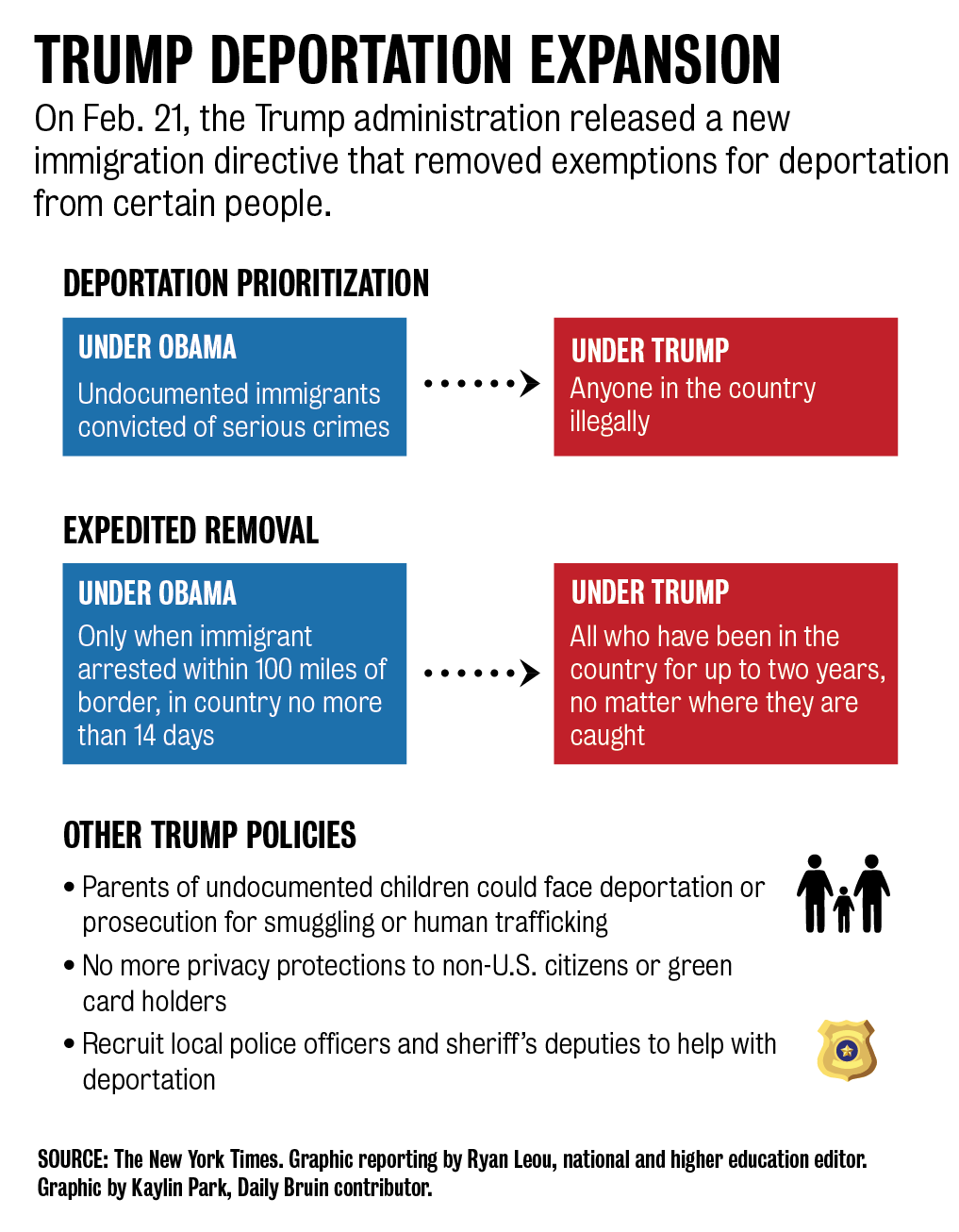UCLA community expresses concern about new looser deportation policies

By Shweta Chawla
March 10, 2017 1:59 a.m.
Undocumented students expressed concern about President Donald Trump’s looser deportation policies, but said they want to continue advocating for those vulnerable to the legislation.
The Department of Homeland Security released new deportation guidelines Feb. 21 that expand the classes of people that immigration enforcement officers can prioritize for deportation.
Under former President Barack Obama, Immigration and Customs Enforcement prioritized undocumented individuals who had committed violent crime for deportation. The new rules expand deportation prioritization to anyone who is in the country illegally.
According to The New York Times, the policies also take away some privacy rights for detained undocumented individuals.
Johana Guerra, a first-year political science student, said she worries more about her family and their safety after the government announced the new policies. She added she thinks the general atmosphere of fear the policies create leads to a new set of problems for undocumented immigrants.
“These are fears I have had for as long as I can remember, so they aren’t necessarily new but they are a new extreme,” Guerra said. “I’m now worried about my aunt, who fears being arrested every time she drops her children off to school.”
Although Trump has said he would not target students for deportation, some students said they think the government’s leniency toward students divides undocumented individuals into different classes.
Frida Ramirez-Aldapa, a fourth-year French and human biology and society student said she thinks state laws supporting undocumented students prioritize some classes of undocumented individuals over others.
California passed a set of laws in 2011, collectively known as the California Development, Relief and Education for Alien Minors Act to allow undocumented students to receive in-state tuition and financial aid.
“The DREAM Act gives people the notion that students who are undocumented have certain qualifications, but this is divisive because it creates the duality of a good and bad undocumented immigrant,” Ramirez-Aldapa said. “Those who are not students may be automatically labeled as bad immigrants, which is a label we have to work against.”
Ramirez-Aldapa, who is on the board of IDEAS, an undocumented student group, said the organization has begun to work with more grassroots organizations to make rhetoric about protecting undocumented people more inclusive.
“Whatever Trump’s claims are, the reality is that he is going after everyone,” Ramirez-Aldapa said. “People have begun to fear coming out about their immigration status publicly, and people who are entering higher education at this point are scared out of their minds because they feel as though they won’t be protected.”
IDEAS members want to use the fact that most students are not targeted for deportation to rally fellow immigrants in support of undocumented people, Ramirez-Aldapa said.
The University of California also released a statement of principles in November that said university police will not help government agencies enforce immigration laws.
[Related: UC makes statement on enforcement of immigration laws in wake of election]
Hiroshi Motomura, a law professor who specializes in immigration, said he thinks Trump’s new policy broadens deportation priorities to the point at which there is no priority.
“Washington seems to be making decisions that give individual officers free reign and give them the power to make arrests, which could be part of their strategy to make people feel insecure,” he said.
Motomura also said he thinks giving individual officers more discretion will make the national immigration system less cohesive as a whole.
Some cities, including Los Angeles, New York and Philadelphia, pledged to resist these policies by prohibiting local law enforcement officers from enforcing federal immigration laws.
“Cities can state that they have scarce dollars available for the police, who will not be able to take on these new roles, or that they believe these policies will undermine community relations,” Motomura said. “Since the Constitution cannot take over state functions, the federal government cannot order local police to spend time on these issues.”
Motomura added he thinks some of Trump’s other proposed immigration policies are a simple solution to a complicated problem.
“It’s counterproductive and misguided, because most (undocumented people) overstayed their visas, rather than crossed unlawfully,” Motomura said. “By forcing Mexico to pay for a wall, it will impoverish the country and result in more undocumented immigration, which is the problem that the administration is attempting to stop.”
Ramirez-Aldapa said she thinks people should find a way to organize locally to support undocumented people.
“Effective change and mobilization is only from the ground up, not through politicians,” she said.

